Faculty Profile: Athina Papadopoulou
Wearable Architecture
Would you wear a shirt that helps you lower your stress during a presentation? What about a shirt that optimizes your performance when running? These ideas might seem right out of science fiction, but Assistant Professor of Architecture Athina Papadopoulou, Ph.D., believes these kinds of smart clothes are on their way to being a part of many wardrobes. Her work on these new materials, which she calls “affective matter,” is an offshoot of architecture and design and may have a significant impact on our daily style and improve the lives of people with disabilities.
“People often ask me how this work relates to architecture,” says Papadopoulou. “In my view, my approach to wearables is very architectural. I regard the materials I make that interact with the body not as ‘devices’ but as ‘wearable environments.’”
According to Papadopoulou, while the concept is high-tech, the notion is familiar. Humans are constantly responding to their environments. We react to light, temperature, and sound without even thinking about it. Designing clothing that responds to physiology by adjusting density, stiffness, or temperature is just the natural evolution of actions as simple as closing the blinds or putting in ear plugs.
“Since ancient times, people have been harnessing the sensory properties of their environments to enhance their health,” she says. “Practices like heliotherapy or hydrotherapy have been used for centuries. Our constructed environments can also have a great impact on our mood and well-being through the sound, light, and social interaction they afford—that is, for me, essentially what architecture is about. As architects, we design for experiences.”
Her current research on therapeutic affective garments addresses the needs of people with disabilities, such as autism spectrum disorder (ASD). In 2023, Papadopoulou received an Internal Support of Research and Creativity Grant as the principal investigator (PI) for the project “Therapeutic Affective Garments (TAG): Emotion Regulation via Haptic Feedback for Individuals with Autism Spectrum Disorder (ASD)” that she is conducting in collaboration with co-Pi Alexander Lopez, J.D., associate professor of occupational therapy. So far, Papadopoulou has designed items programmed to change temperature and shape and even produce a hugging feeling based on the wearers’ breathing rate. “We are testing how guiding the breathing through the haptic [relating to the sense of touch] feedback can either increase calmness or produce energizing feelings, thus helping people with either hyper-aroused (high sensitivity to stimuli) or hypo-aroused (low sensitivity to stimuli) profiles, respectively.”
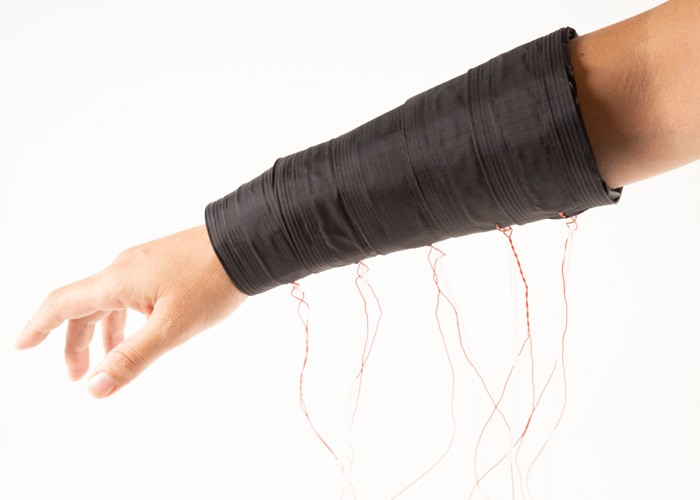
“Therapeutic affective garments can take the form of a sleeve, vest, even socks and pants,” says Papadopoulou. “Currently, we are testing the impact of a pneumatic affective sleeve on individuals with ASD to enhance self-emotion regulation and cognitive performance. I am simultaneously developing a programmable huggable vest and experimenting with a programmable glove to aid in hand mobility and control issues.”
Aiding people with ASD is just the beginning. Papadopoulou feels the practical applications of this technology can be far-reaching and life changing. “We might be able to address blood circulation issues and athletic performance through breathing control. I have also conducted research in haptic communication via programmable wearable environments that potentially can be useful for nonverbal individuals or neurotypicals in remote locations.”
Part of the overall mission is to de-stigmatize disabilities through design. “Think about eyewear. Most of us have eye problems, and the eye glasses are a medical prosthetic. These have become so fashionable that some people wear eyeglasses even when their eyes are perfectly fine,” she says. “So, can we make hearing devices so beautiful that people without hearing loss want to wear them?”
By developing affective matter, Papadopoulou hopes to design clothes and environments that will make the future look and feel more inclusive for all.
By Alix Sobler

Athina Papadopoulou
Title: Assistant Professor
Department: Architecture, Health And Design
Joined New York Tech: 2022
Campus: Long Island
More Features
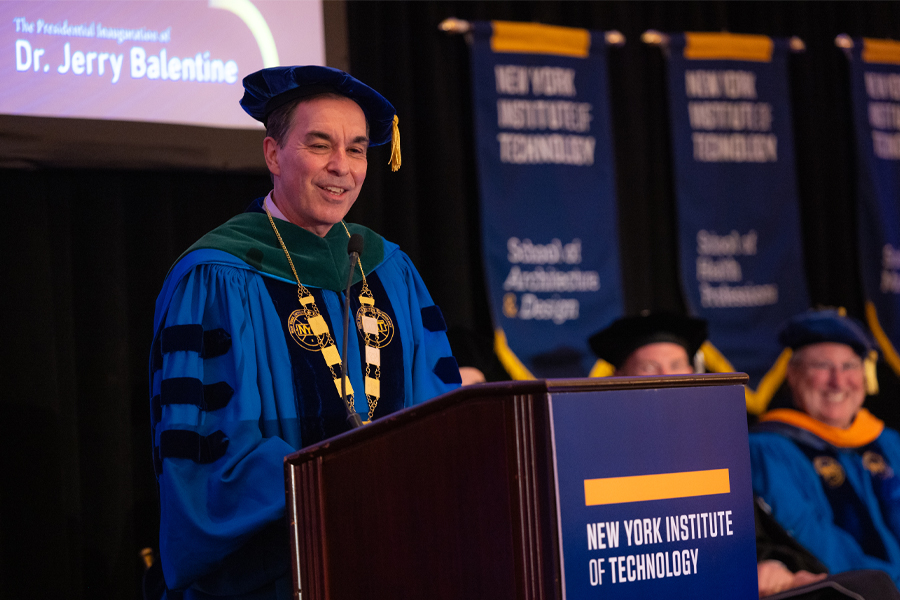
The Installation of President Jerry Balentine, D.O.
On October 16, surrounded by respected colleagues, family, and friends, Jerry Balentine, D.O., was installed as the fifth president of New York Institute of Technology.
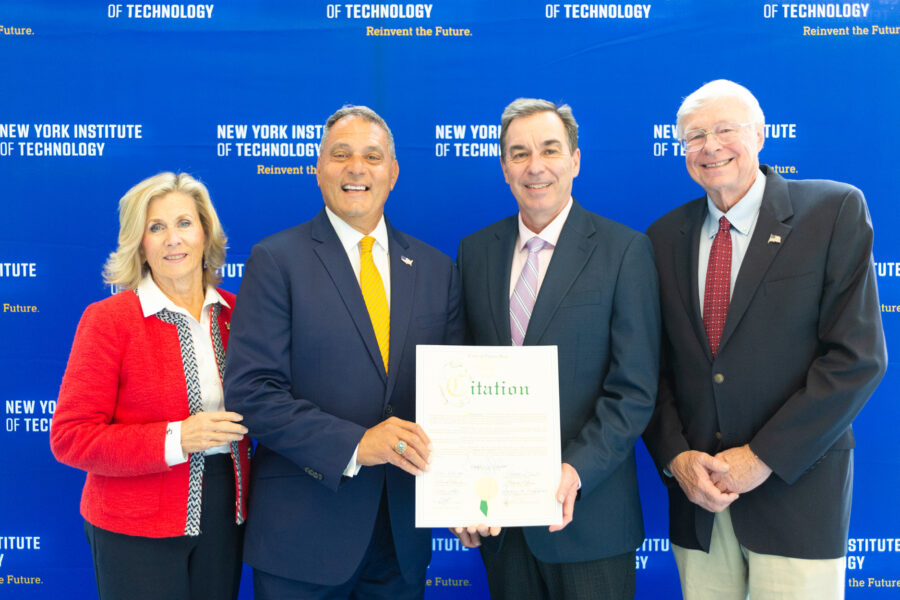
Startup Tech Central Officially Opens
Members of New York Tech and the local community gathered to celebrate the grand opening of Startup Tech Central, a resource for students to transform ideas into real-world impact.
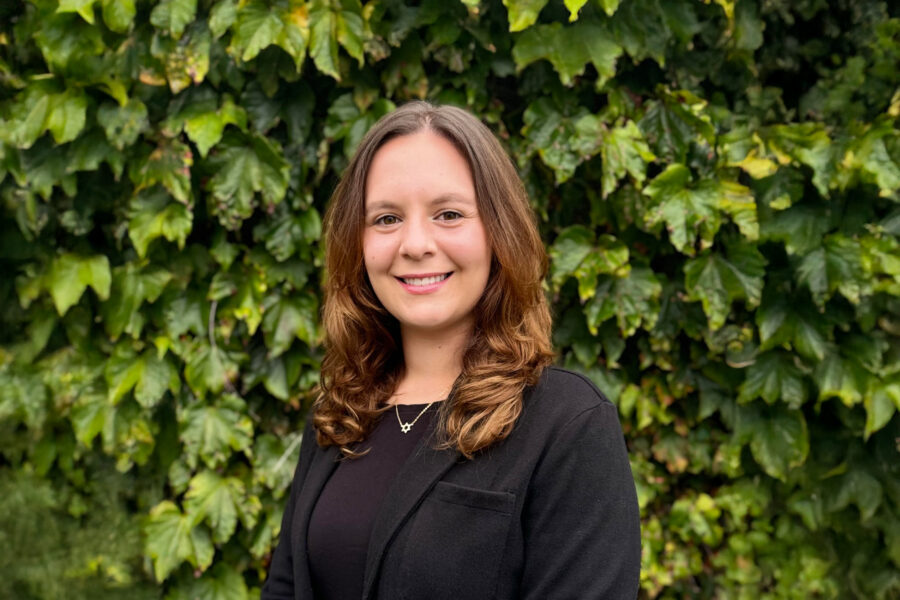
Using Architecture to Help People
Chana Rhodes was drawn to architecture because she wants to help people. The AIA scholarship winner is doing just that by designing spaces for course projects with humans—and animals—in mind.

Bridging Business Knowledge With AI
The School of Management has embraced and integrated AI into its courses, focusing on teaching students how to leverage technology to help achieve their goals in the classroom and beyond.
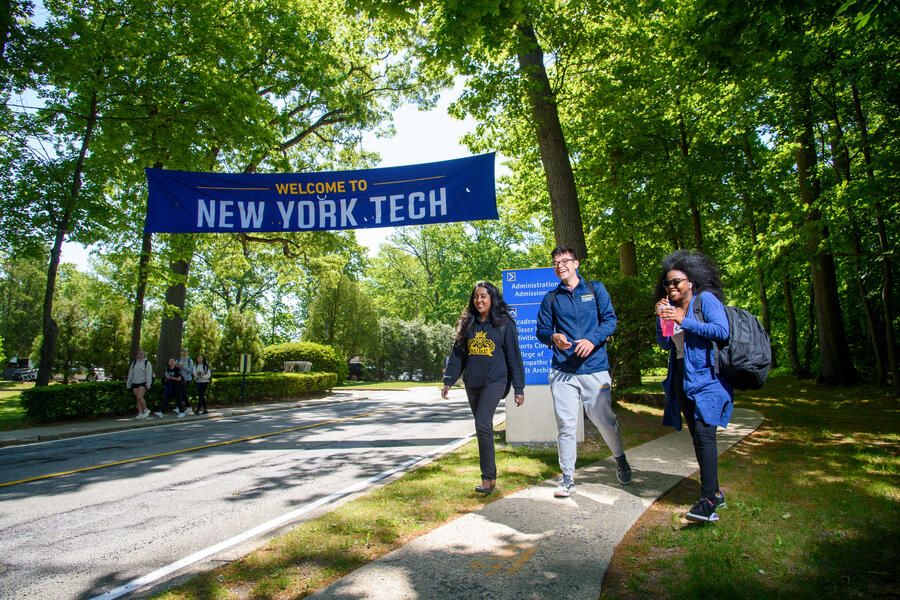
Innovation and Social Mobility Recognized in U.S. News Best Colleges Rankings
New York Tech was recognized for both its innovation and social mobility among universities in the North in the U.S. News & World Report 2026 Best Colleges rankings.

New York Tech Celebrates National Hispanic Heritage Month 2025
The university will host a series of events to celebrate Hispanic Heritage Month.